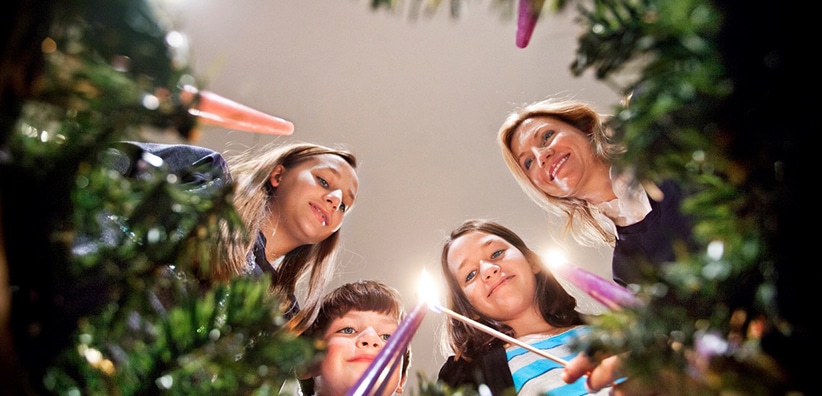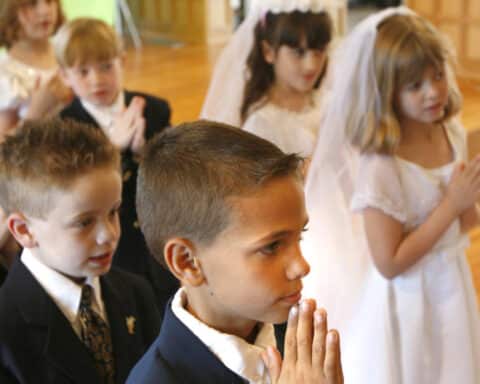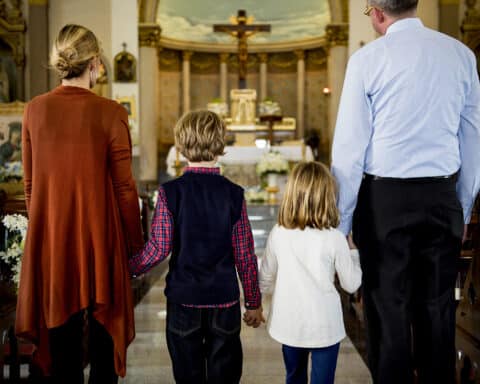I don’t mean to alarm you, but it’s almost Christmas. Advent — what’s left of it — is a time of preparation, but unless you live a very unusual life, you probably need some time to prepare for this season of preparation.
We have done various things over the years to try to make Advent a season of anticipation that leads up to a day of Christ-centered joy, rather than a month-long wallow in decorations and cookies that leads to a volcano of presents. We fail every single year.
But we do always try. The nice thing about Christmas is that it’s a birth, and that means it’s a beginning, not a culmination. Call me hopeful or call me delusional, but I always feel like as long as we TRY, then we’re getting Advent and Christmas right.
Preparing to prepare
So this is how we try: We set aside the day after Thanksgiving as Jesse Tree Day. And that is about all we do the day after Thanksgiving. The kids are home from school, nobody expects me to cook anything elaborate, and God has granted me the gift of a profound unwillingness to rush out and shop for amazing Black Friday deals at Target. So Friday is the day of getting ready to get ready.
The first step is to choose a list of Jesse Tree readings. The idea is to find one that more or less matches up with the actual calendar. Advent begins Dec. 3 this year, but if we end up with one that starts on Dec. 1, it doesn’t matter that much, because we know we’re going to miss some days anyway, so it all evens out. Then I print it out, round up the kids, and read off the symbols, and they dibs the ones they want to do.
Some years, I get fancy and buy special paint markers and a bunch of blank capiz shell discs with holes drilled in them, so we end up with a set of more or less uniform ornaments. Other years, I just open the infamous craft cabinet and pull out everything that looks like it won’t cry if you put glue on it. (This is my first act of Christmas Generosity: I renounce my claim on anything I put out on the table. If you’re not going to use the good stuff for getting ready for Jesus, then what in the world are you saving it for?)
Then I start some music going. In this house, we do not listen to Christmas music before the day after Thanksgiving; and the very first one we listen to is “A Medieval Christmas” by The Boston Camerata. The kids groan and complain, but I’m a big believer in building unwilling fondness through repetition. I choose my battles with music, but I insist on this one at least once a year. This is my first act of Christmas Bullying, which is also an essential part of the season, if you’re in charge of other people.
So then I toss the list with names into the middle of the craft heap, and I leave the room. The kids are going to be incredibly mean to each other while they work, which is just how they show affection; and they are going to make an insane mess, which is something I don’t need to see happening. This is my first act of Christmas Surrender. Some things are beyond my control, and it’s very good to keep this in mind and not waste emotional energy getting upset about it.

An opportunity for meaning
Eventually, all the ornaments are done. Some of them are lovely, some of them are weird, some of them are cute, and some of them are baffling; but the main thing is, I achieved some buy-in. The kids, with varying degrees of enthusiasm, have all had to sit with two or three or four words or phrases or images from Scripture, think about what they might signify, and bring that thought into being in some way.
I don’t mean to exaggerate how profound the process is. Sometimes a kid just hears “sacrifice of Isaac” and thinks “knife!!!” and then uses tinfoil to make a little knife. Or sometimes one doesn’t want to be there at all, and hears something about the heavens, and figures he or she can make some stars real quick and then get out of there.
All the same, it’s an opportunity. I can’t make anybody have a meaningful experience, but I can set up a situation where such a thing is likely to happen, and I can repeat it every year, and provide happy associations with it, and increase the chances, when my kids grow up, they might even want to recreate the experience with their own families.
When the ornaments are all done, I put them in a box along with the list of readings, and in the evening (on the evenings we manage to say our prayers), the kid who made the ornament for that day reads the little verse that goes along with it, and hangs their ornament on the tree (or branch, or stick, or wire, or whatever we managed to rig up that year). Occasionally, the reading of the day will spark some kind of conversation or meditation, but more often, we just get it done.
The long game
And what gets done? We get the word of the Lord out into the air of our home almost every day. We thought about the stories of the Old Testament, and we have been thinking about them year after year. We say the name of Jesus out loud. We do it year after year, and we’re going to keep doing it. That’s actually kind of a big deal! Dare I say, it’s a success. Or at least the beginning of a success. Or at least the possibility of a success. And that is something I’ve learned to be content with.
Parents may not realize this, but we’re playing a long game. Sometimes we do something for our kids, hoping for some immediate return on our investment — some obvious signs that they hear us and understand what we want them to know, and grasp how important it is, and go forth into the world bearing the gifts we have given them. This is hardly ever going to happen!
It’s a cliche to say that raising kids is more like planting seeds, but there’s really no better analogy. You really just have to lean into believing that the seeds you’ve got — your best efforts to give them something good, something appealing, something that will serve them for the rest of their lives — are good, and then you have to give them space, and above all, you have to give them time.
Take heart
Some of these seeds grow very slowly, and may not even begin to sprout until decades later. If they bear fruit at all, it may not be until after you die. (And here you can see a good example of my Christmas Death Thoughts, which are, for whatever reason, also an essential part of how I celebrate Advent.)
But Christmas is a birth. A beginning, not a culmination or an obvious triumph. Take heart, parents. It’s a long game. A lot of the time, being a good parent feels like bullying, or giving in, or forcing yourself to be generous when you don’t want to be, or just walking away and letting things work out as they will. Sometimes it feels like dying. Give it time. Give it to the Lord, and give it time. It’s a long game.





